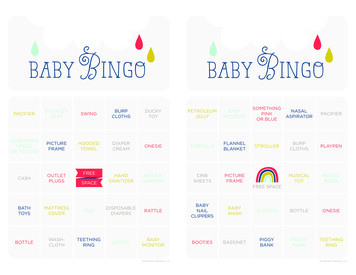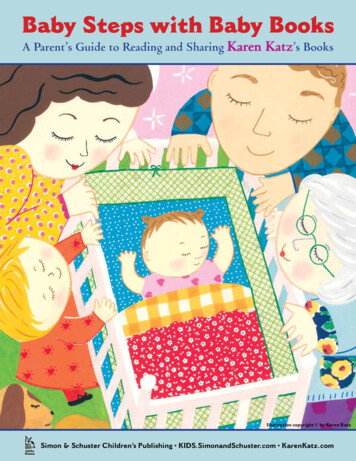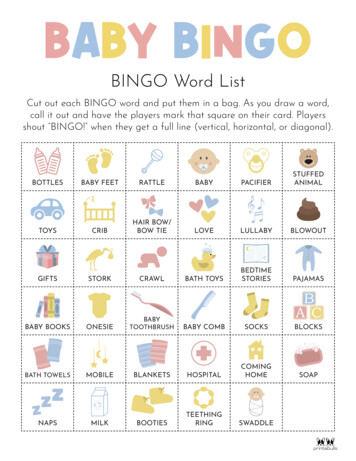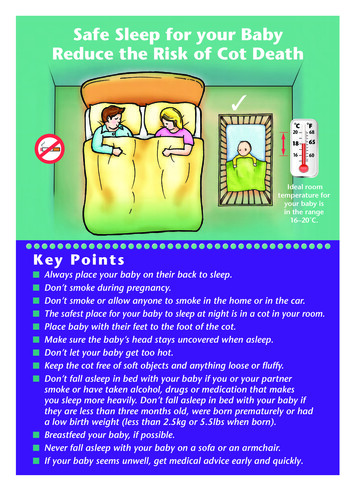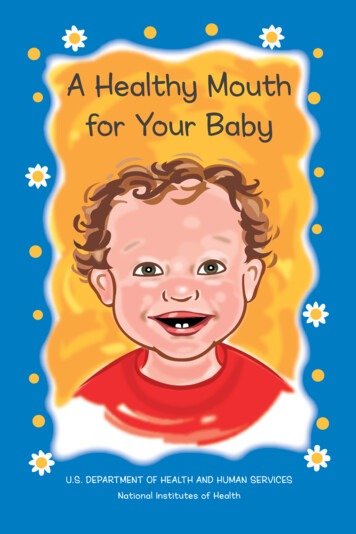
Transcription
Bonding With Your BabyWhat’s HappeningAttachment is a deep, lasting bond that developsbetween a caregiver and child during the baby’sfirst few years of life. This attachment is criticalto the growth of a baby’s body and mind. Babieswho have this bond and feel loved have a betterchance to grow up to be adults who trust othersand know how to return affection.What You Can DoNo one knows your child like you do, so you are inthe best position to recognize and fulfill your child’sneeds. Parents who give lots of loving care andattention to their babies help their babies develop astrong attachment. Affection energizes your child togrow, learn, connect with others, and enjoy life.Here are some ways to promote bonding:What You Might Be SeeingNormal babies: Have brief periods of sleep, crying or fussing, and quietalertness many times each day Often cry for long periods for no apparent reason Grow and develop every day; they learn new skillsquickly and can outgrow difficult behaviors in a matterof weeksLove to be held and cuddledRespond to and imitate facial expressionsLove soothing voices and will respond with smiles andsmall noises Respond when your baby cries. Try tounderstand what he or she is saying to you. You can’t “spoil” babies with too much attention—they needand benefit from a parent’s loving care even when they seem inconsolable. Hold and touch your baby as much as possible. You can keep him close with baby slings, pouches, orbackpacks (for older babies). Use feeding and diapering times to look into your baby’s eyes, smile, and talk to your baby. As your baby gets a little older, try simple games and toys. Once your baby can sit up, plan on spendinglots of time on the floor with toys, puzzles, and books.Read, sing, and play peek-a-boo. Babies love to hear human voices and will try to imitate your voice andthe sounds you make.The best gift you can give your baby is YOU. The love and attention you give your baby now will staywith him or her forever and will help your baby grow into a healthier and happier child and adult.This tip sheet was created with input from experts in national organizations that work to protect children and strengthen families. Todownload this tip sheet or for more parenting tips, go to g or call 800.394.3366.Strengthening Families and Communitieswww.childwelfare.gov/preventing73
Dealing With Temper TantrumsWhat’s HappeningTwo- and three-year-olds have many skills, but controlling their tempers isnot one of them. Tantrums are common at this age because toddlers arebecoming independent and developing their own wants, needs, and ideas.However, they are not yet able to express their wants and feelings withwords. Take comfort in the fact that most children outgrow tantrums by age 4.What You Might Be SeeingNormal toddlers: Love to say “no!” “mine!” and “do it myself!”Need lots of fun activities, play times, andopportunities to explore the world Respond well to a routine for sleeping and eating(a regular schedule) Are not yet ready to share Like to imitate grownups and to “help” mom and dadTest rules over and over to see how parentswill reactWhat You Can DoIt is often easier to prevent tantrums than to deal with them once they get going. Try these tips: Direct your child’s attention to something else.(“Wow, look at that fire engine!”) Give your child a choice in small matters. (“Do youwant to eat peas or carrots?”) Stick to a daily routine that balances fun activitieswith enough rest and healthy food. Anticipate when your child will be disappointed.(“We are going to buy groceries for dinner. Wewon’t be buying cookies, but you can help mepick out some fruit for later.”) Praise your child when he or she shows selfcontrol and expresses feelings with words.If you cannot prevent the tantrum, here are some tips for dealing with it: Say what you expect from your child and haveconfidence that your child will behave. Take your child to a quiet place where he or she cancalm down safely. Speak softly or play soft music. Remain calm. You are a role model for your child. Holding your child during a tantrum may help ayounger child feel more secure and calm downmore quickly.Some children throw tantrums to seek attention.Try ignoring the tantrum, but pay attention to yourchild after he or she calms down. Resist overreacting to tantrums, and try to keepyour sense of humor.When your child is having a floor-thumping tantrum, the most important thing you can do is remain calmand wait it out. Do not let your child’s behavior cause you to lose control, too.This tip sheet was created with input from experts in national organizations that work to protect children and strengthen families. Todownload this tip sheet or for more parenting tips, go to g or call 800.394.3366.Strengthening Families and Communitieswww.childwelfare.gov/preventing75
Connecting With Your TeenWhat’s HappeningMany teens spend less time with their families thanthey did as younger children. As they become moreindependent and learn to think for themselves,relationships with friends become very important.Sometimes it may feel like your teen doesn’t need youanymore. But teens still need their parents’ love, support,and guidance.What You Might Be SeeingNormal teens What You Can DoSimple, everyday activities can reinforce the connectionbetween you and your teen. Make room in your schedulefor special times when you can, but also take advantageof routine activities to show that you care. Crave independenceQuestion rules and authorityTest limitsCan be impulsiveMake mature decisions at times, and childishones at othersTips to keep in mind: Have family meals. If it's impossible to do every night, schedule a regular weekly family dinner night thataccommodates your child's schedule. Share “ordinary” time. Look for everyday opportunities to bond with your teen. Even times spent driving orwalking the dog together offer chances for your teen to talk about what's on his or her mind. Get involved, be involved, and stay involved. Go to games and practices when you can. Ask abouthomework and school projects. Look for chances to learn about your teen’s latest hobby. Be interested. Make it clear that you care about your teen's ideas, feelings, and experiences. If you listento what he or she is saying, you'll get a better sense of the guidance and support needed. Get to know yourteen’s friends and their parents, too, when possible. Set clear limits. Teens still need your guidance, but you can involve your teen in setting rules andconsequences. Make sure consequences are related to the behavior, and be consistent in followingthrough. Choose your battles. Try to provide choices in the matters that are less important.Your words and actions help your teen feel secure. Don’t forget to say and show how much you love your teen!This tip sheet was created with input from experts in national organizations that work to protect children and strengthen families. Todownload this tip sheet or for more parenting tips, go to g or call 800.394.3366.Strengthening Families and Communitieswww.childwelfare.gov/preventing77
.stneraPTeenYou’re Not Alone!ppeningWhat’s Ha?Being a parent is a 24-hour-a-day job, andsometimes it can feel overwhelming. Youmay be juggling the demands of a baby,your family, school, and work. Chances areyou’re not able to do all of the things youenjoyed before your baby was born.I Do ?What CanMany teen parents sometimes feel Confused and uncertain—about their future ortheir skills as a parent Overwhelmed—they don’t know where to beginor they feel like giving up Angry—at the baby’s other parent, their friends,or even their baby Lonely—like they are the only person dealing withso many problems Depressed—sad and unable to face their problemsThese feelings do not mean you are a bad parent!Every parent needs support sometimes. If you think stress may be affecting how you treat yourbaby, it’s time to find some help. Try the following: Join a support group. A group for young moms or dads could give you time with newfriends who have lives similar to yours. Your children can play with other children, and youcan talk about your problems with people who understand. Look on the Internet or call yourlocal social services agency for information about support groups in your community.Find ways to handle stress. Take a break while someone reliable cares for your baby. Takea walk with the baby in a stroller, or rest while your baby naps. A social worker or nurse canhelp you learn other ways to manage stress.Finish school. Even though it may be difficult, finishing high school (or getting a GED) is one ofthe most important things you can do to help your baby and yourself. A diploma will help youget a better job or take the next step in your education (such as vocational training or college).Improve your parenting skills. Don’t be afraid to ask for advice from experienced parents.Classes for parents can also help you build on what you already know about raising a happy,healthy child.Call a help line. Most States have help lines for parents. Childhelp runs a national 24-hourhotline (1.800.4.A.CHILD) for parents who need help or parenting advice.Stay in contact with friends and family who support you and make you feel good aboutyourself. Remember, help is just a phone call away!This tip sheet was created with input from experts in national organizations that work to protect children and strengthenfamilies. To download this tip sheet or for more parenting tips, go to g or call 800.394.3366.Strengthening Families and Communitieswww.childwelfare.gov/preventing79
Ten Ways to Be a Better DadWhat’s HappeningChildren need both parents. Involved fathers can help childrenlead lives that are happier, healthier, and more successfulthan children whose fathers are absent or uninvolved. Fatherswho spend time with their children increase the chances thattheir children will succeed in school, have fewer behaviorproblems, and experience better self-esteem and well-being.What You Can Do1. Respect your children’s motherWhen children see their parents respecting eachother, they are more likely to feel that they are alsoaccepted and respected.2. Spend time with your childrenIf you always seem too busy for your children,they will feel neglected no matter what you say.Set aside time to spend with your children.3. Earn the right to be heardBegin talking with your kids when they are veryyoung and talk to them about all kinds of things.Listen to their ideas and problems.4. Discipline with loveAll children need guidance and discipline, notas punishment, but to set reasonable limitsand help children learn from natural or logicalconsequences. Fathers who discipline in a calm,fair, and nonviolent manner show their love.5. Be a role model6. Be a teacherA father who teaches his children about right andwrong and encourages them to do their best will seehis children make good choices. Involved fathersuse everyday examples to teach the basic lessonsof life.7. Eat together as a familySharing a meal together can be an important partof healthy family life. It gives children the chance totalk about what they are doing, and it is a good timefor fathers to listen and give advice.8. Read to your childrenBegin reading to your children when they are veryyoung. Instilling a love for reading is one of the bestways to ensure they will have a lifetime of personaland career growth.9. Show affectionChildren need the security that comes from knowingthey are wanted, accepted, and loved by theirfamily. Showing affection every day is the best wayto let your children know that you love them.Fathers are role models whether they realize it ornot. A girl with a loving father grows up knowingshe deserves to be treated with respect. Fathers 10. Realize that a father’s job is never donecan teach sons what is important in life byEven after children are grown and leave home, theydemonstrating honesty, humility, and responsibility.will still look to their fathers for wisdom and advice.Fatherhood lasts a lifetime.Adapted from National Fatherhood Initiative. Find the full brochure at www.fatherhood.org/10ways.aspStrengthening Families and Communitieswww.childwelfare.gov/preventing81
Raising Your GrandchildrenWhat’s HappeningNo matter why or how they came to live with you, yourgrandchildren will benefit from being in your home.When children cannot be with their parents, living witha grandparent may provide: Fewer moves from place to placeThe comfort of a familiar language and cultureA chance to stay with siblingsMore contact with their parents, depending onthe situationWhat You Can DoIt will take time for your grandchildren to feel safeand secure in their new home with you. You canencourage these good feelings in a number of ways: What You Might Be SeeingDespite these benefits, the children will face someunique challenges. They may feel insecure and unsure that you willtake care of them. They may act out or challenge you.They will miss their parents.They may be anxious or depressed.They may seem young or act too old for their ages.Set up a daily routine of mealtimes, bedtime, and other activities.Help your grandchildren feel “at home” by creating a space just for them.Talk to your grandchildren, and listen when they talk to you.Set up a few rules and explain your expectations. Then, enforce the rules consistently.Reward positive behavior. When children make mistakes, focus on teaching rather than punishing.Be as involved with their school as you can,and encourage your children to participate in school activities.This is a big job, and you may need help from your community. Here are some suggestions: Help with housing or other bills, clothing, or school supplies may be available specifically for grandparentsraising grandchildren in your community. Join a support group. Often there are local groups for grandparents raising grandchildren.Ask for help and referrals from a church leader, the counselor at your child’s school, or a social services agency.If necessary, get professional help to address your grandchild’s special needs, such as medical care, mentalhealth care, or special education.Parenting the second time around brings special challenges and special joys. Do not hesitate to ask for helpor seek services in your community for yourself and your grandchildren.This tip sheet was created with input from experts in national organizations that work to protect children and strengthen families. Todownload this tip sheet or for more parenting tips, go to g or call 800.394.3366.Strengthening Families and Communitieswww.childwelfare.gov/preventing83
A group for young moms or dads could give you time with new friends who have lives similar to yours. Your children can play with other children, and you can talk about your problems with people who understand. Look on the Internet or call your local social services agency
